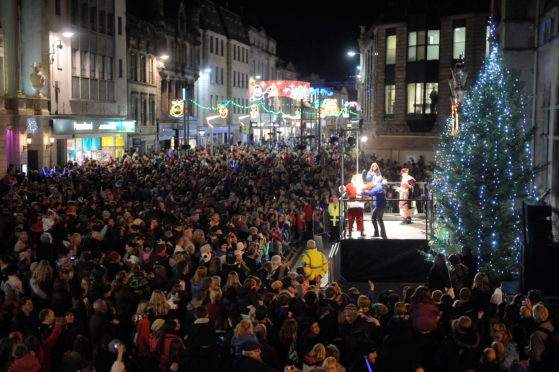Dozens of community events could be under threat as it emerged that Highland Council wants to charge organisers to shut the public roads used to stage them.
Groups organising Christmas lights switch-ons, road races, street fares and town galas could be hit with £675 for a one-off road closure or £3,375 for a permanent traffic regulation order that would cover several events. Fees for advertising and safety inspections would be included in the new policy.
In October, Police Scotland wrote to Scotland’s local authorities to advise that officers will no longer regulate traffic at events which have not been granted a TRO.
A council spokeswoman said the charges would be to recoup administration and advertisting costs to the local authority for obtaining the TROs as part of the new formal process.
This week, members of the Environment, Development and Infrastructure committee agreed to defer the policy proposals – which would be reviewed after a year – until more detail is provided on which events would be affected. But it is expected that the policy will be implemented in some form.
It is understood that Armed Forces and Armistice Day events, as well as funeral processions and small-scale community events would be exempt from the charges.
Last night Nairn and Cawdor councillor Liz MacDonald said it appeared the charges would affect “almost every” community event which has more than 50 participants.
Ms MacDonald, who helps organise Nairn’s annual Christmas lights switch-on, added: “For an organisation to be paying £675 for a one off event is unaffordable. At a time when the council is doing less and asking communities to do more, I think it’s unacceptable to charge them as well. It’s too much. It would be the death knell for the events that people work so hard for. It’s hard enough to get volunteers without having to scrape around for money to pay for what the council used to do.
“They have not consulted with a number of groups or community councils about this and have just decided. This is going to be a shock to a lot of community councils.”
Mary MacDonald, chairwoman of Alness Community Council, said: “We can fully understand that the council has to make cuts to balance the budget but in light of many groups and charities, which are looking for help to raise funds because funds have been cut, it’s a double edged sword.”
Under the council’s proposals, a £675 charge would be applied to an organisation seeking a temporary TRO for a one off event.
Obtaining a permanent traffic regulation order (PTRO) with “minimal consultation” would cost £1,125. But a PTRO with “extensive consultation” – when an organiser has not undertaken any advanced consultation or could face objections – would cost £3,375.
The council report said that to reduce costs involved in making temporary TROs each year, where feasible it is intended to arrange for permanent TROs. These would be introduced in locations where a series of events in a year or annual events are arranged.
The report also said the policy would apply to street parties which are not subject to the same legislation as processions but may require other licencing.
Fees of £60 will apply for advertising TROs for the likes of galas or small small community events, charity events without an entrance fee with more than 50 participants, or processions and marches with more than 20 participants.
Games and sporting events and commercial events, regardless of size, will also be charged the £60 advertising fee.
There will also be inspection fees in certain circumstances to ensure appropriate traffic control measures have been taken into account. These range from £50 on weekdays to £100 at night on weekends – and an extra £100 for holidays.
During Thursday’s debate in chamber, Inverness Central councillor Richard Laird said: “We don’t have enough information here as to what would have happened if the policy was brought in three years ago. Which processions which would have gone ahead would fall under the bracket? Would Caley Thistle or Ross County have had to pay for their victory parades?”
Despite initial concerns, Dingwall and Seaforth councillor Angela MacLean said that some community councils were under the impression police would have still come forward with charges of up to £1,000.
She said: “As we go towards a sitting budget they have told us to be more business like and get full costs recovered, and to look at other ways of generating income and I think that’s what this is doing.”
